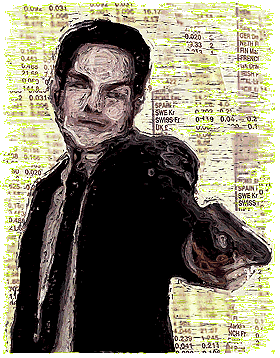
In these days of excess volatility and irrational exuberance, the madness of crowds is all around us. On the front page or the nightly news, "crowd" means working-class mob -- stampeding soccer fans crushed to death against a riot-control fence.
But the upper class has its own, somewhat more sublimated forms of mob violence and mass manias. The financial markets are a killing field for the tasseled-loafer crowd, governed by fear, fads, and greed.
Another, more solitary madness is "day trading," the high-risk online gambling brought to the nation's attention by Mark O. Barton, the chemist-turned-day trader who shot nine people dead in two Atlanta brokerages before killing himself. Day trading, in the typically understated language of one how-to bible, is "the church of what's happening now." Calling it a People's Temple for would-be Warren Buffetts might be more accurate. Thousands have quit their jobs to chase the bull-market mirage of instant millions conjured up by day-trading firms and the media. Working in public boutiques or out of their homes, they gamble on the minuscule, minute-by-minute fluctuations in a stock's price. Day traders can make small fortunes -- or lose their shirts -- in a single day.
Most take a bath. A report on public day trading released by the North American Securities Administrators Association noted that 70 percent of "public traders will not only lose, but will almost certainly lose everything they invest." Mark O. Barton hemorrhaged approximately $105,000 in 15 days of trading at Momentum Securities. When he bottomed out, Momentum's manager told him he'd have to ante up more cash to keep playing. He wrote a check for $50,000, which bounced. The next day, Barton returned with another kind of payback: a Colt .45 and a Glock 9 mm. Observing that "it was a bad trading day and … going to get worse," he opened fire.
Archaeologists of amok culture have been hard at work excavating the deeper meanings of Barton's act. Pundits have made much of the note he left before he went on his shooting spree, with its fulminations against "this system of things" and "the people that greedily sought my destruction." His Oedipal father-fixation has been eagerly dissected by our therapy-group culture.
The depth psychology of the hysterical male is a hot topic these days. By contrast, the yawning income gap and socially corrosive envy that haunt the Long Boom are about as sexy as Bob Dole's public confessions of erectile dysfunction. Obviously, it took more than income inequality to pull Barton's pin. Still, his tale of ordinary madness sheds light on the hidden costs of the New Economy.
The media air is thick with tales of twentysomethings whose IPOs have made them overnight millionaires. At the same time, the U.S. has the most unequal income distribution of any advanced industrialized country.
The financial markets are exacerbating that gap. Thanks to the highest levels of stock-market valuation in over a century, the top five percent of American households, who own 94.5 percent of all individually held stock, are getting richer than God. "One thing the financial markets do very well," notes Wall Street commentator Doug Henwood, "is concentrate wealth." Day trading is a carny-barker come-on to the rubes, a get-rich-quick scheme to beat a "system of things" that usually sheds its grace only on those born into the old-money plutocracy.
John Skiersch, a former nightclub show manager, was seduced into day trading by a firm's populist pitch: "They said, 'Where else are you going to make hundreds of thousands of dollars a year without going to medical school?'" As always, it's the working poor and the middle class living beyond their means who need to believe in lotteries and sweepstakes and all the other miracle medallions and healing cloths that capitalism offers the rabble, to fan their hopes and keep them docile.
And, as always, the odds are stacked in the house's favor. The managers of day-trading firms ("the people that greedily sought [Barton's] destruction"?) collect their commissions whether you win or lose, and give you the bum's rush when you're tapped out. "In the end," says Skiersch, "you realize that you've been had, that it was all a con. I know [day traders] who said they were going to kill themselves and that they were going to kill someone else on their way out."
Evidently, those defeatists hadn't read "The Mental Aspect of Trading" by day-trading evangelist Linda Bradford Raschke. "Everyone is capable of being a successful trader if they truly believe they can be," exhorts Raschke. "You must believe in the power of belief." The power of positive thinking is the predictable answer to her rhetorical question, "If you're a trader just starting out, where do you find the initial confidence to pull the trigger?" Barton had an answer of his own.
Mark Dery has written about new media, fringe thought, and unpopular culture for The New York Times Magazine, Rolling Stone, The Village Voice Literary Supplement, Suck, and Feed. His collection of essays, The Pyrotechnic Insanitarium: American Culture on the Brink was published by Grove Press in February, 1999.
